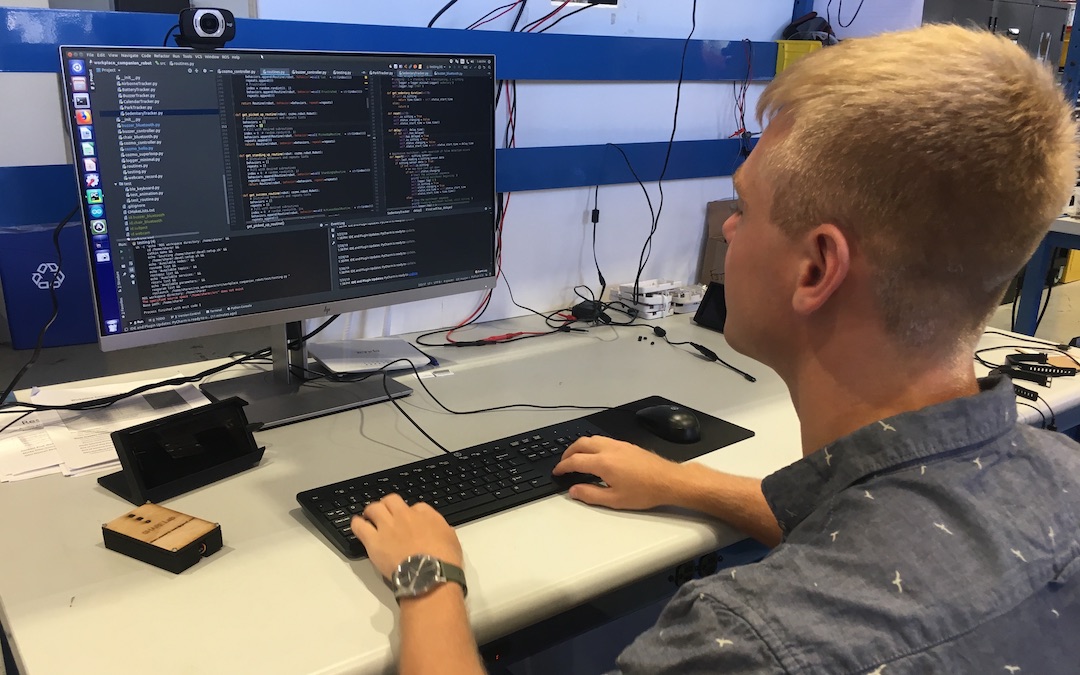Robot Nudges
We are studying how small and low-cost socially assistive robots can encourage frequent computer users to take breaks and be more active during the workday. This work is supported by the NSF under award IIS-2441795.

Problem
In our original work in this space, we considered that as computer use becomes more central to work in many fields, office workers face increased risks of health challenges including heart disease, diabetes, and eyestrain due to prolonged periods of sitting and looking at a screen without taking a break. These individuals can benefit from taking breaks, standing up, and moving around, but there is no universally effective method for encouraging these behaviors in the workplace.
Extending this initial idea, we are now also studying how robot nudges might be able to support older adult wellness in a range of ways.
Solution
We propose socially assistive robots as a means to deliver successful prompts for computer users to take breaks, stand up, and be more active during the workday. Past work suggests the physical embodiment of a robot can facilitate more positive responses and adherence to stimuli than onscreen prompts or other non-embodied solutions. Accordingly, we propose to gain an understanding of what behaviors of a social and physically embodied SAR system are most effective for encouraging healthier workplace practices during short- and long-term studies.
The field of human-robot interaction does not yet understand well why this robot embodiment presents advantageous differences. This is also something we are studying in the lab.
In coming applications, we also propose to use robot nudges to support older adult health through activities like healthy hydration support, physical exercise, cognitive exercise, and social stimulation.
People
- Triniti Armstrong (PhD Student)
- Courtney (CJ) Chavez (Undergraduate Researcher)
Publications
- Christopher A. Sanchez, Lena Hildenbrand, and Naomi T. Fitter, "We see them as we are: How humans react to perceived unfair behavior by artificial intelligence in a social decision-making task," Computers in Human Behavior. Artificial Humans, 2025. [BibTeX] [PDF]
- Triniti Armstrong and Naomi T. Fitter, "Evaluating Q-Learning-Based Robot Nudging for Healthier Computer Use Practices," Proceedings of the Workshop YOUR Study Design! Participatory Critique and Refinement of Participants Studies Workshop, held in conjunction with the 2025 ACM/IEEE International Conference on Human-Robot Interaction (HRI), Melbourne, Australia, 2025. [BibTeX] [PDF]
- Rhian C. Preston, Kenna Dinsdale, Madison R. Shippy, and Naomi T. Fitter, "Robot-Mediated Nudges for Workplace Health: Not a One-Size-Fits-All Modeling Problem," International Journal of Social Robotics, 2023. [BibTeX] [PDF]
- Rhian C. Preston and Naomi T. Fitter, "Increasing personalization in long-term interactions with a workplace companion robot," Proceedings of the Lifelong Learning and Personalization in Long-Term Human-Robot Interaction (LEAP-HRI) Workshop, ACM/IEEE International Conference on Human-Robot Interaction (HRI), Boulder, CO, USA (remote), 2021. [BibTeX] [PDF]
- Brian J. Zhang, Ryan Quick, Ameer Helmi, and Naomi T. Fitter, "Socially assistive robots at work: Making break-taking interventions more pleasant, enjoyable, and engaging," Paper accepted to the IEEE/RSJ International Conference on Intelligent Robots and Systems (IROS), Las Vegas, Nevada, USA (remote), 2020. [BibTeX] [PDF]
